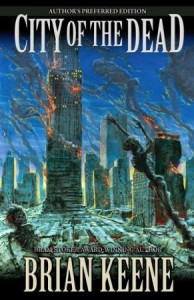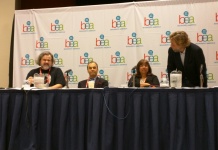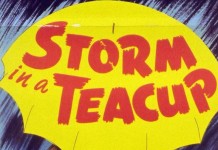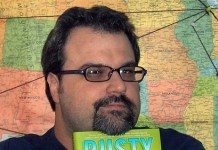
Brian Keene was the Friday keynoter at the Creatures, Crime and Creativity Conference last weekend, and it was one of the best keynotes I’ve heard. He’s published the text of his speechon his blog, and I suggest you pop over and give it a read.
I was fortunate enough to have the opportunity to interview him between panels the next day. We covered some of the same ground as in his speech, but he added some significant details.
TeleRead: So last night you talked about the problems of being a writer, and then you turned it around and talked about the rewards. Would you like to expand on that?
Brian: Well, for anyone who is writing fiction or writing anything, really, their end goal and desire is to be read by others through publication. You’re not writing stories and then locking them away in a trunk. The ultimate goal is to be able to write full time, to be able to earn enough from publishing that you can quit your day job. I pointed out last night that while it’s great to fantasize about being a best-selling writer, there are a lot of realities people don’t consider. As a full-time writer, you don’t have health insurance. You don’t have a 401K. There’s not really a retirement plan, and you are responsible for taking care of these things yourself.
TeleRead: I think people have the idea that these books are going to live on so that if you have enough of them–I mean you have 40–that you’ll be making enough in residual income that you’ll be fine.
Brian: I do. I make residuals every month, and my annual income–it varies–but it’s roughly between $40 and $60K a year. That’s total. Depending on where you live, it’s hard to support your family on that. Your finances are always in flux. That’s why you’ll find that midlisters such as myself in genre fiction, we’re not just taking a year to craft a book. We’re busting our butts to put out two or three a year. It takes me about four months to write a novel. I’m lucky enough that in horror fiction you can get away with less of a word count than say, science fiction. 80,000-90,000 words–or even 70,000–can be a full novel in horror. That helps speed up the process. Yes, I do hate to make it sound un-romantic because it is art, but at the end of the day, you’ve created a product for mass consumption, and you’ve got to crank out the next product and get the sales.
TeleRead: One hears that some authors are artificially limited to one book a year, depending on how the contracts are written. How have you broken that?

Brian: Absolutely. I work on multiple things at the same time. I write–I mean fingers on the keyboard–eight hours a day. Every day, including weekends. There might be days where I take off, but I try to stay with the schedule. During those eight hours, I may work on Novel #1 for four hours and then switch gears and work on a comic book script or Novel #2, but I always have more than one thing going, and I find that, creatively, that’s beneficial. If I’m not feeling Novel #1 that day, I can switch over to something else.
TeleRead: So you haven’t had an issue with a publisher saying, “We can’t accept another work this year. You’ll have to twiddle your thumbs for the rest of the year.”
Brian: No, if I ever ran into that, I’m lucky enough that there are plenty of other publishers who will say, “Ooh! We’ll take it!” No, I’m grateful to be in that position. I do know writers who have probably handicapped themselves that way by dealing with one publisher and signing an exclusivity deal with them. There are still ways around that though. You could always release under a pseudonym, for example.
TeleRead: So we all hear about self-publishing. Konrath’s blog is basically the poster child for self-publishing, and lots of writers are getting their rights back and going that route. You said last night that you’d gotten most of your rights back?
Brian: I’ve gotten the rights back to everything. There’s only one novel that I don’t control all the rights for, but I’m happy with who does control them. It’s interesting that you mention Konrath. I remember when he was just starting out. He was asking questions of everybody. I met him at a convention party, and he had his notebook out and was asking questions of me. I thought at the time that this guy was going to go far, and he was doing it right. He investigated every aspect of this business, right at the start. And look at what’s he’s done. He’s the standard-bearer. I came into self-publishing late. I was of the generation that was taught “Don’t self-publish your work. Don’t go to a vanity press.” It wasn’t until I saw the success of friends like Konrath, Robert Swartwood and Scott Nicholson that I thought, “Hey, there’s a way to do this right.” I think it’s important to keep in mind that you still need an editor. In fact, I would say if you’re self-publishing that you need an editor more than ever. You still need an eye to give it a critical read. You need to think about things like cover art. Don’t just slap some Photoshopped image on there. Pay the money for an editor. Pay the money for professional cover art. Understand that in self-publishing, you’re going to be your own marketing team. You can’t just put it up on Amazon and expect it to sell. There’s a lot of hard work that comes with self-publishing, but the rewards are also a lot better.
TeleRead: So you have some books out that are self-published? And I’m curious. You said last night that you’re tracking, but you didn’t say what the results are.

Brian: I’ve kept a foot firmly in each camp, and there are a couple of reasons for that. Number one, my primary publisher right now, Deadite Press, I’m happy to be with them. It’s such a great relationship. They treat me so well, and there’s no way I’d walk away from that. But at the same time, there are works that might not fit with what they are publishing, and I’ve decided to self-publish and see what comes of it. Right now, from a financial standpoint, I find it’s about even. I’m making about the same from self-publishing as I am from them.
TeleRead: If you’re making about the same, does that mean you’re making more now than the $40-$60K a year you mentioned earlier?
Brian: Well, this will be the first year that I think we might see an increase, and quite frankly, that’s due to self-publishing. The year’s not over. I don’t know what the final figure will be, but I do think we’re going to see an increase in income this year. Which is awesome.
I don’t like to predict the future, but I do see a future where there won’t be a Barnes & Noble. I think they’re going to go the way of Borders, and I think they bring it on themselves. Understand that I have many friends employed by Barnes & Noble, but you walk into a chain bookstore, and there’s not all the categories. You can’t find a horror section, for example, but there are people who want to read horror novels, so they’re going to opt for Kindle. I think in ten years, publishing as a business will be so different from what we have now. Self-publishing. How books are sold. I think we will see independent bookstores come to the forefront. I think they’re going to be stronger when all this levels out, but I also think they will be more devoted to certain niches, like Mystery Loves Company, who’s displaying at this conference. I think you’ll see a lot more like that.
If you’re self-publishing, you have to create a business plan. You can’t just be the writer and write the book and throw it up there on Kindle or CreateSpace. You are your marketing department. You are your agent. You are designing your own ads. You are all of that. It’s a lot more involved than just writing the book, but as I said, the rewards are there.
TeleRead: Any final words?
Brian: The era we live in–people are reading more than ever, and they have access to books more than ever. If you’ve ever wanted to be a writer, now is the time to strike. Everything’s exciting and new with self-publishing and Kindle. That will crest eventually, because these things always do. Everything runs in cycles. So get in now.
TeleRead: Thank you for taking the time to speak with me.
Brian: You’re welcome.

































Great interview. It’s interesting to see him changes his attitude toward self-publishing. I think many authors are realizing there is, indeed, a right way to do it.
@Susan, Thanks! He was fun to interview.
Wait until I finish transcribing my Jeffery Deaver interview. He has quite a different view of self-publishing, which isn’t surprising, considering how his career has differed from someone like Brian.